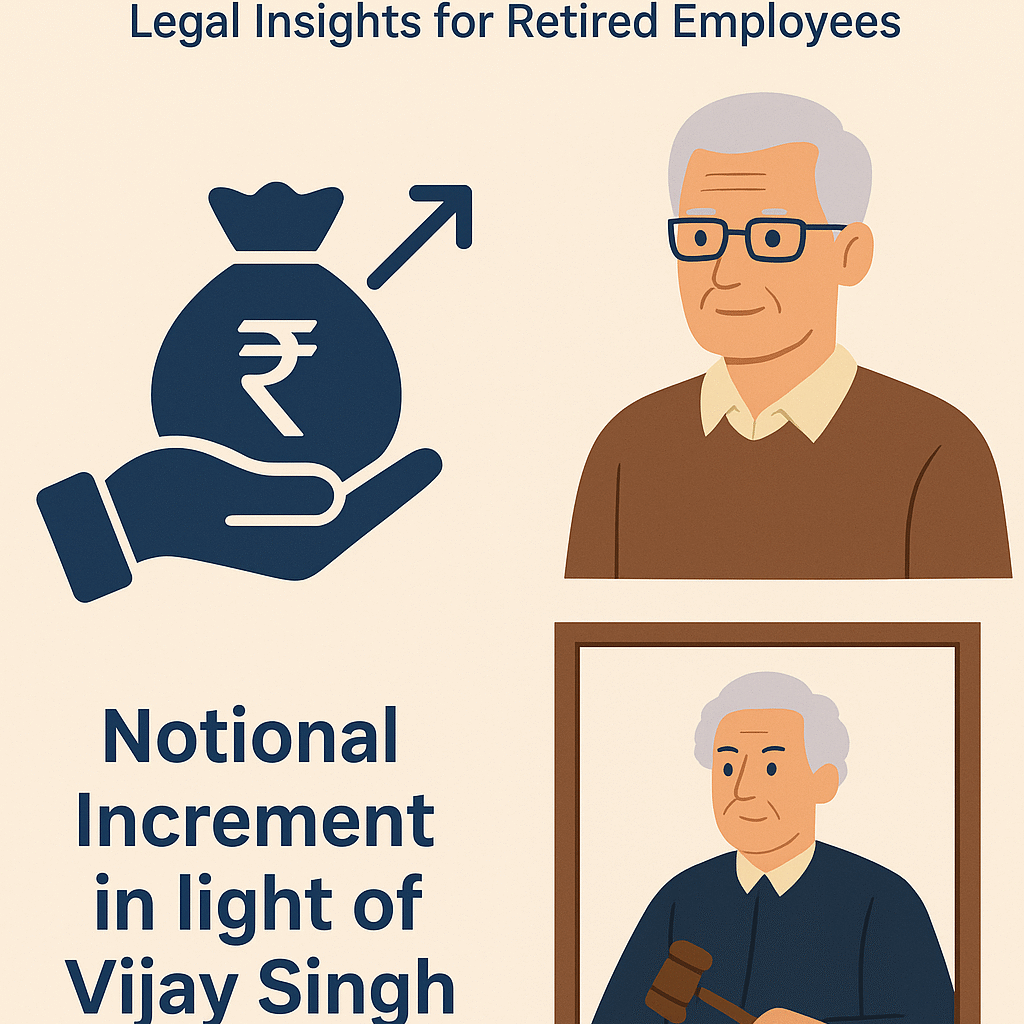Introduction

- IIn India, many government employees retire on June 30th, just a day before the usual annual increment date of July 1st. This creates a peculiar situation: the employee misses out on the increment despite having completed a full year of service. To address this, courts have recognized the concept of a “notional increment”—a hypothetical pay increase not disbursed in cash, but considered when calculating pension and retirement benefits.
- This ensures fairness by acknowledging the employee’s service until the last day of June, preventing loss of pension benefits due to technicalities. When authorities deny this benefit, affected employees may approach courts with the assistance of a skilled service advocate in Jodhpur to claim their rightful entitlement
Case Analysis
In this case, the petitioners argued that the respondents denied them the benefit of a notional increment
because they retired one day before it was due. The petitioners maintained that they had worked diligently throughout the year and retired on June 30 after reaching the age of superannuation, with no pending departmental inquiries or judicial proceedings. Therefore, they believed they were entitled to receive the annual increment. The petitioners further argued that denying the increment solely because they were not employed on the preceding day would be arbitrary and violated the principle of reasonableness under Article 14 of the Constitution.
On the other hand, the respondents argued that the rule-making authority had designated July 1 as the date for the annual increment for all employees, asserting that this rule was reasonable and non-discriminatory. In considering whether the petitioners were entitled to receive the notional increment, the Court referenced the cases Director, KPTCL v. C.P. Mundinamani and All India Judges Association v. Union of India. These cases established that a retired employee is entitled to one annual increment, which they earned on the last day of their service in the year preceding their retirement, provided they had exhibited good behavior and efficiency.
The Court opined that “the grant of increment was not a matter of course and was dependent upon good
conduct of the government servant for the entire year. It was, therefore, natural that good conduct must be observed for the entire year before the increment accrues. Where entitlement to receive a benefit crystallized in law its denial would be arbitrary unless it was for a valid reason”. The Court further opined that a government servant was not holding the post on the day when the increment became payable could not be a valid ground for denying an increment
The Court concluded that the increment payment scheme should be interpreted as a whole, and parts of
Rule 14 of the Civil Services (Revised Pay) Rules, 2008, and Rule 13 of the Rajasthan Civil Services
(Revised Pay) Rules, 2017, should not be read in isolation to undermine the other parts that grant
government servants the right to receive an increment. This interpretation ensures the integrity of the
progressive appointment scheme and protects the rights of government employees.
The Court noted that the Supreme Court had resolved these issues in the C.P. Mundinamani and All India
Judges Association cases, and judicial propriety demands adherence to the Supreme Court’s rulings. The
stability and finality of judicial decisions are paramount, and reopening concluded judgments would
undermine the administration of justice. Therefore, the Court held that the petitioners were entitled to a
notional increment on July 1, despite their retirement on June 30. The Court directed the respondents to
reconsider the petitioners’ cases and grant the notional increment.
Conclusion
The Court concluded that employees retiring on June 30 are entitled to a notional increment, referencing the Supreme Court cases Director, KPTCL v. C.P. Mundinamani and All India Judges Association v. Union of India. It held that denying the increment based solely on the retirement date is arbitrary and violates Article 14 of the Constitution. The Court emphasized the importance of the progressive appointment scheme and protecting employees’ rights. Therefore, it directed the respondents to grant the notional increment to the petitioners and pay pension arrears within three months.
For retired employees in Rajasthan, denial of notional increment can significantly reduce pension and gratuity. If you or someone you know faces such an issue, Shekhawat Legal offers dedicated expertise in service law matters. Our experienced service advocates in Jodhpur can help secure rightful pension benefits, ensuring fairness and justice even after retirement.
Written By – Adv. Pradhyumn Singh Shekhawat
Phone no. 9462643100
FAQs
What is notional increment promotion?
Notional increment promotion is a concept where service members are temporarily promoted to a higher rank for pay and allowance purposes, without actually changing their official rank or assuming the full responsibilities of that higher position. This practice is typically used to compensate personnel who have reached the top of their pay grade but are not yet eligible for actual promotion. It helps retain experienced personnel by providing financial incentives and recognizing their skills and experience, even when structural limitations prevent immediate advancement in rank.
What is the meaning of notional pay fixation?
Notional pay fixation is a method used in government and some corporate sectors to determine an employee’s salary when there’s no clear corresponding pay scale or when transitioning between pay structures. It involves calculating a hypothetical or ‘notional’ salary based on various factors like experience, qualifications, and previous pay. This approach is often used during pay revisions, promotions, or when employees transfer between departments or roles with different pay scales. The goal is to ensure fair compensation and maintain pay equity while adapting to new salary structures or unique employment situations.
What is the first July increment rule?
The First July Increment Rule is a policy in some government and organizational pay systems where employees receive their annual salary increment on July 1st, regardless of their actual date of joining or last promotion. This standardized date simplifies payroll administration and ensures uniformity in pay increases across the organization. Employees who have completed at least six months of service by July 1st are typically eligible for this increment. For those who joined less than six months prior, the increment may be deferred to the next cycle. This rule helps streamline salary management and budget planning.
What is notional pay in salary?
Notional pay in salary refers to a hypothetical or theoretical pay amount used for calculation purposes rather than actual payment. It’s often employed in situations where an employee’s regular pay structure doesn’t apply, such as during special assignments, promotions, or transfers. Notional pay helps maintain fairness and consistency in compensation by providing a reference point for benefits, allowances, or future pay adjustments. It’s particularly useful in complex pay systems, like government services or multinational corporations, where direct comparisons between different roles or locations may be challenging. Notional pay ensures equitable treatment in various HR and payroll scenarios.


Add a Comment